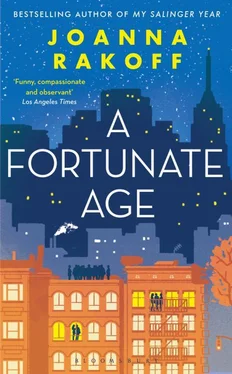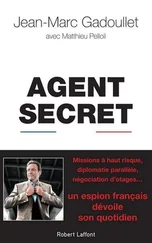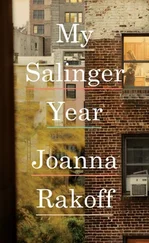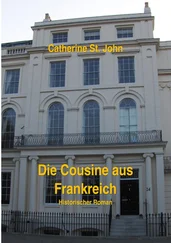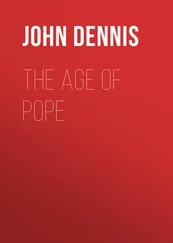Joanna Rakoff
A FORTUNATE AGE
What she was clear upon was, that she did not wish to lead the same sort of life as ordinary young ladies did; but what she was not clear upon was, how she should set about leading any other…
—GEORGE ELIOT, DANIEL DERONDA
On a gray October day in 1998, Lillian Roth found herself walking down the stone-floored aisle of Temple Emanu-El, clad in a gown of dark ivory satin and flanked by her thin, smiling parents, who had flown into New York from Los Angeles a mere seven days earlier, still in mild shock that their obstreperous daughter was submitting to the ancient rite of marriage. The synagogue’s vaulted ceiling spinning above her, she took small, self-conscious steps toward the bima, where a serious-faced young man named William Hayes—saddled with the improbable nickname of Tuck—waited for her in an unfamiliar black suit, purchased two days earlier by his mother, who’d deemed the gray suit selected by Lil and Tuck inappropriate for an evening affair.
Four years and four months prior, Lillian had graduated from Oberlin College with honors in English (just plain honors, she often reminded herself in the years that followed, not highest honors, like her friend Sadie Peregrine, or even high honors, like their departmental nemesis, Caitlin Green). At her commencement brunch, dressed in another frock of dark ivory, she’d made a scene, feverishly arguing with her father about the purpose of marriage in the modern age. “It’s an outmoded institution,” she’d insisted, her dark brows moving closer together. The brunch, sponsored by the college, was held in a dank tent on Wilder Bowl, and the Moët was flowing perhaps a bit too freely. Lil had already spilled several sips down her dress. “Read any modern thinker—” Struggling to come up with a specific name, she looked to her friends, her “crowd,” as her father annoyingly called them—Sadie, Beth Bernstein, Emily Kaplan, Tal Morgenthal, and Dave Kohane—who sat around and opposite her, surrounded by their own parents, faces flushed proud. “They all say so.”
The adults grinned serenely ( smugly , to Lil’s mind) and tilted their heads toward her, in gestures of intense patience. “You want a certain sense of security ,” suggested Sadie’s mother, Rose, with whom Lil was a great favorite, having been brought home to the Peregrine town house for numerous Thanksgivings and spring breaks and even one summer, which Lil recalled as two months of unbridled bliss. “At a certain point, you want to belong to something, to a family.”
Dave’s mother leaned across the table toward Lil, her long red hair falling into the remains of her omelet. “I remember saying the exact same thing when I was your age.”
“ Mom ,” Dave moaned.
“Really?” said Lil, biting bits of dried lipstick off her lower lip. “I really don’t think I’m going to change my mind.” Her elders shared a dark glance. “I mean, is there any reason why people should get married?” Lil’s father raised his wiry black brows, white threads extending from them like antennae, and let a gust of air out through his nose, from which hairs, white and black, also poked, mortifyingly. Twenty-odd years in Los Angeles had done nothing to weaken his Brooklyn accent.
“Taxes,” he grumbled. “You get some tax breaks if you’re married.”
“ Barry ,” cried Lil’s mother, giving his arm a push.
Lil rolled her eyes. “Then why,” she asked, “do I always hear people complaining about the ‘marriage penalty’?”
Those five friends now sat in the synagogue’s front benches—soon they would be called to the bima to take part in the ceremony—the girls zipped and laced and strapped into evening dresses, which they’d carried uptown in plastic garment bags and hung up to steam in the guest bathroom at the Peregrine town house, almost thirty blocks north of Emanu-El. They’d emerged from the 6 train at Eighty-sixth Street in the early morning to the sights of this strange and hectic neighborhood: blonde moms in jogging suits pushing goggle-eyed babies in old-fashioned prams; fancy grocers and chemists; matrons with pageboys, in dated suits and low-heeled pumps, and even, in some cases, neat fabric gloves. Such things proved exotic to these girls, who were just discovering the city from the vantage point of its more downtrodden, Bohemian outposts: Williamsburg, Carroll Gardens, the grimy fringes of the Lower East Side. All neighborhoods that now command impressive rents, but were then regarded as vaguely suspect and marginally safe, particularly by the parents of the young persons in question.
Not that they cared (“Mom, it’s fine !”). They lived where they could afford to live without the dreaded parental supplementation: in run-down tenements on narrow Brooklyn blocks, illegal sublets found through friends of friends (who could afford a broker’s fee?), or rickety apartments in crumbling back-houses, let by landlords who’d never heard the word “code” in their miserly lives and who insisted on installing everything—from stoves to toilets—themselves, despite their inability to read English-language instruction manuals. According to Lil, Emily’s apartment, on an increasingly expensive block in Williamsburg, had almost exploded a year prior, when the landlady used water piping rather than gas piping in the flat’s little wall heater. “The gas just ate through the pipes,” Lil had told Beth, breathlessly, over the phone. “She got home from work and there was gas puddled all over the floor. The fumes were so strong she could smell them on the street. Brooklyn Gas told her that if she’d worked an hour later, the place would have blown.” Emily had stayed with Lil, at her place on Bedford, for nearly a week before things were straightened out.
And though Emily and Sadie worked in midtown and Lil attended Columbia, they met at bars in the East Village, coffee shops on the Lower East Side, and restaurants in Brooklyn, which Sadie Peregrine had, for a year or two after college, until the joke became old and a little embarrassing, called “the Far East,” as she’d never visited the borough in her youth, never mind that her mother had grown up in Greenpoint, in a railroad apartment above Sadie’s grandfather’s optician shop (though she behaved, as Sadie liked to say, relishing the cliché, as though she were to the manor born).
Thus, the Upper East Side—where Sadie herself was born and raised, as were several generations of Peregrines before her—was alien territory to the other girls, save for the occasional trip to some doctor or other or, of course, to the Peregrine house, where they were occasionally brought round for dinner or Sunday breakfast with the dwindling Peregrine clan. Said neighborhood struck them as utterly outside the realm of their New York (the real New York, Emily privately thought, though she would never say so in front of Sadie), it being primarily inhabited by persons of some degree of wealth or those who aspire to it. Which is not to say that these girls—and their male counterparts, Dave and Tal—did not come from money, for, in a way, they did. With their shining hair and bright, clear eyes, they, all of them, were the dewy flowers of the upper middle class and, as such, were raised in needlessly large houses with a surplus of bathrooms and foodstuffs in the fridge, with every convenience, every luxury, every desire met. Their high school classmates—the superstudents of Scarsdale (Beth), Brookline (Tal), Sherman Oaks (Lil), and so on—were starting residencies at Mt. Sinai or on the partner track at Debevoise; they were, perhaps, even living in the blank residential towers of the East Nineties (despised by Sadie’s parents for blocking their view), biding time before making their escapes to Westchester or Long Island or even (dread!) New Jersey.
Читать дальше
